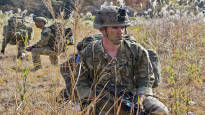In Britain, the military leadership makes the government and the people aware of the threat of war and demands the establishment of a citizen’s army.
LONDON In Britain, the army leadership is warning the people to move, citing the growing threat of war against Russia. Commander of the Ground Forces, General Patrick Sanders wants to train and arm citizens in case of a possible ground war.
Sanders calls on the country’s leadership to launch a citizen army of men and women that could participate in a ground war. He does not demand conscription, but calls for a change of attitude in a country that is used to a professional army based on volunteerism.
Sanders calls for citizens to take up arms because, according to him, the British army is too small. According to the general, the ground forces are not enough to fight against Russia. He called for increasing the current 74,000-strong infantry force to 120,000.
– But even this is not enough, Sanders said last week in his speech at the international exhibition of armored vehicles in London.
According to Sanders, the conflict in Ukraine “brutally demonstrates that armies start wars, citizens win them.”
– Our friends in Eastern and Northern Europe, who feel the Russian threat more acutely, have already started to prepare national combat readiness, he said.
Army and government on different lines
The armed forces have long been dissatisfied with the government’s defense budget cuts, which have led to a reduction in the number of soldiers. A total of 184,000 people are currently actively serving in the entire armed forces.
However, the British Prime Minister’s office downplayed the general’s assessments as “useless” predictions about future conflicts. Deputy Minister of Defence James Heappey says that talk of introducing conscription because of a possible war between NATO and Russia is nonsense.
Former Prime Minister Boris Johnson on the other hand, supported the exhortation of General Sanders, and promised himself to join the citizen’s army, if one were formed.
Sanders’ speeches are related to the wider debate in Europe about the possible expansion of the war to NATO countries. Former commander of NATO’s European forces, General Richard Shirreff wrote in The Timesthat it is “time to think about the unheard of” and consider conscription in Britain as a deterrent against Russia.
The Chairman of the NATO Military Committee, Admiral by Rob Bauer according to the British people need a change of attitude to an era when “anything can happen at any time”.
Conscription has been valid in Britain only twice, during the First and Second World Wars. According to the Ministry of Defence, Britain has no intention of introducing general conscription.
The United States brings nuclear bombs to England
According to the Daily Telegraph The US plans to deploy nuclear warheads to Britain for the first time since the Cold War. The United States withdrew Cold War-era nuclear weapons from Suffolk in 2008.
According to procurement documents of the US Department of Defense seen by the newspaper, the United States is preparing a nuclear weapons-related mission at the RAF Lakenhead base in Suffolk, southern England, in the near future. The base is used by the US Air Force.
According to the newspaper, B-61 nuclear bombs with an explosive power equal to about four bombs dropped on Hiroshima in World War II will be placed at the base. The base also has F-35 stealth fighters.
Housing for US troops will begin to be built in June. Ballistic shields would have been ordered for the base to protect “valuable property”.
A representative of the British Ministry of Defense said to the pressthat Britain and NATO are not in the habit of admitting or denying the presence of nuclear weapons at any location.
Among the NATO countries, Germany surpassed Britain in the defense budget last year. Britain is now third behind the US and Germany, despite spending $65.8 billion on defense last year.
Despite cutting defense spending, Britain has actively supported Ukraine. It has provided 5.4 billion euros in military support over the past two years.
This year, Britain is sending military aid worth nearly three billion euros. It has trained Ukrainian soldiers and civilians and supplied weapons, armored vehicles, cruise missiles and drones, among other things.
British warships, on the other hand, are involved in the conflict in the Red Sea against the Houthi rebels for the first time in twenty years.
